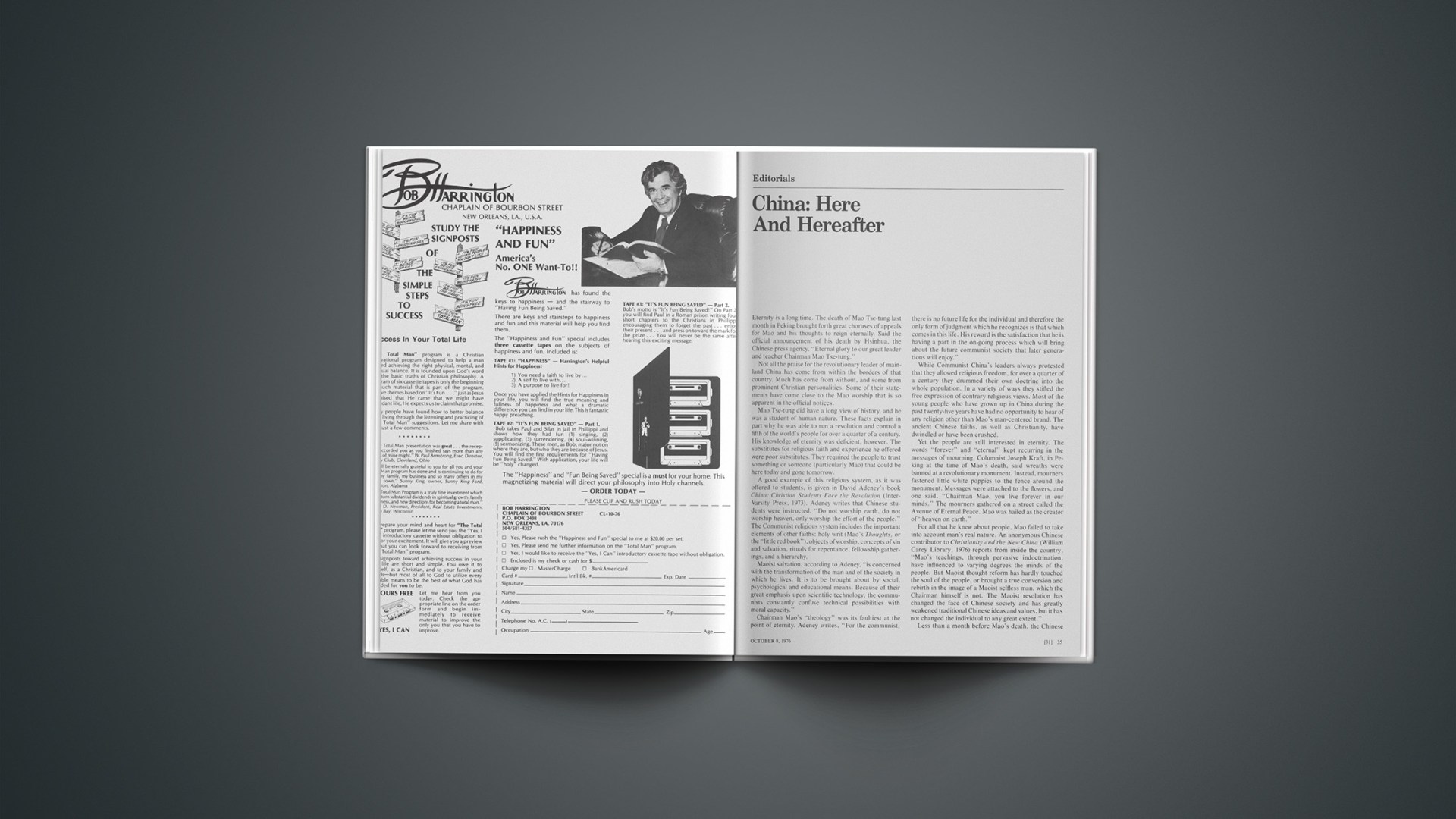A group of people known as the Genesis Project want to perform plastic surgery on the face of church-school education. It will take some thirty-two years to complete, but the operation is under way. Here is the way Genesis sees a newmedia Sunday-school class.
The lesson: Luke 1. The Bible: a ¾ inch video cassette (also available in 16mm or 8mm film). Teaching materials: two filmstrips per cassette, with record or cassette recordings, leader’s guide, and a new magazine, Bible Times. The students don’t read the lesson; they watch and hear it. The video portion was filmed in Israel in color. Background music is an original score. No dialogue is used other than that recorded by the writers of Scripture. Elizabeth, Zechariah, Mary, and Joseph speak Hebrew in the background while the class hears a word-for-word narration in either the King James, the Revised Standard, or possibly the New American. If it’s King James, Alexander Scourby narrates; Orson Welles handles the Revised Standard. The actors, other than the Israeli actor Topol, who plays Abraham in this series, are unknowns.
Prolific film producer John Heyman, who began research for the Genesis Project (or the New Media Bible) six years ago, serves as chief executive officer. Over the next thirty-two years he plans to film the entire Bible for sale to churches, synagogues, libraries, and educational institutions. A charter subscription costs $2,000. After November 1 the price goes up $500.
The first twenty-two chapters of Genesis and chapters one and two of Luke are the initial installments of the multi-million-dollar project ($5 million has been spent so far, the money raised from American and British businessmen). Portions of the Old and New Testaments will be filmed and issued year by year. Early in the marketing stage the company has sold more than 400 subscriptions.
Each film runs fifteen to twenty minutes. The story of Noah, presented as a colorful cartoon, might disappoint more conservative churches or schools. But the New Media Bible leaders have tried to translate Scripture into film with authenticity and without a liberal or conservative approach. The other sections of Genesis are realistic and straightforward; the birth of Cain is perhaps too realistic for younger children. The journeys of Abraham present some interesting sociological facts, and the accompanying filmstrips and magazines detail what is shown on film.
Unlike much Sunday-school material, Bible Times thoroughly explores the cultural setting of the biblical narratives and provides maps, photographs, and glossaries to aid in the study of Scripture. The magazine also explains how Bible history fits into the history students learn in school.
To appeal to as broad a market as possible, the New Media Bible is available in two different tracks. The basic film is the same, but the support material comes in either a liberal or an evangelical color. Leaders used conservative scholars as resource personnel for the evangelical track. And the inerrancy of Scripture is upheld in both magazine and filmstrips.
Each magazine includes a scholars’ “Roundtable” discussion that considers the Bible passage and its interpretation. The late Charles F. Pfeiffer edited the section on Abraham’s first journey. Among the others involved were Ronald Youngblood from Bethel Seminary and Marvin Wilson from Gordon College.
Genesis leaders want to provide a solid tool for teaching the Bible in today’s visually oriented society. How the material is used and what interpretation certain thorny passages get will rest with the church or institution.
How well the project succeeds in creating a new tool to revive the ailing Sunday school will depend in part on how well the producers have translated the Bible into film. The Luke films, completed after the ones from the book of Genesis, show an exceptional level of sensitivity to the texts. Since we hear no dialogue, the strength of the films depends almost totally on the facial expressions of the actors, camera angles, color, and to a degree the background music.
The segment on the Annunciation melds music and action. The temple scenes are compellingly low key. And the camera shots through the menorah (Jewish candelabra) add texture and depth to what could have been a bland, documentary-like shot. The narration never overpowers the action. Through careful editing, the narration was blocked to provide silent spaces when our attention focuses on the acting. Zechariah’s encounter with the angel is one of the most moving sections of the film. The mellow colors, too, contribute to this visual feast. Although I didn’t think the Nativity film as strong or visually effective as the one on the Annunciation, it is frames ahead of the sentimental celluloid we usually see.
Fifteen minutes is a short running time for a film, but the producers have used skill and imagination to insure an intense, involved reaction from their audiences. Because these are educational films first, anything longer would have overloaded us.
The first segments were not the most challenging to film (though they may have been the most challenging to film in a fresh way). What will Heyman and company do with Paul’s letters, David’s Psalms, or Solomon’s Proverbs? And think of the decisions regarding the book of Revelation.
Authenticity and educational effectiveness can be achieved in many ways. To me, a blend of scholarly research, imaginative filming, and twentieth-century technology—the way the New Media Bible has chosen—is one of the best. We remember what we see. If the Genesis Project succeeds only in bringing freshness to the familiar passages of Scripture, it will have been well worth the effort. And it promises to do much more.










